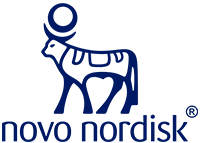Home > Rare bleeding disorders > Rebinyn®

Rebinyn® Formulary Kit
Rebinyn® [Coagulation Factor IX (Recombinant), GlycoPEGylated], is indicated for use in adults and children with hemophilia B for on-demand treatment and control of bleeding episodes, perioperative management of bleeding, and routine prophylaxis to reduce the frequency of bleeding episodes. See limitations of use below.
We didn't find any resources that match your selection.
Please adjust your filter(s) and try again.
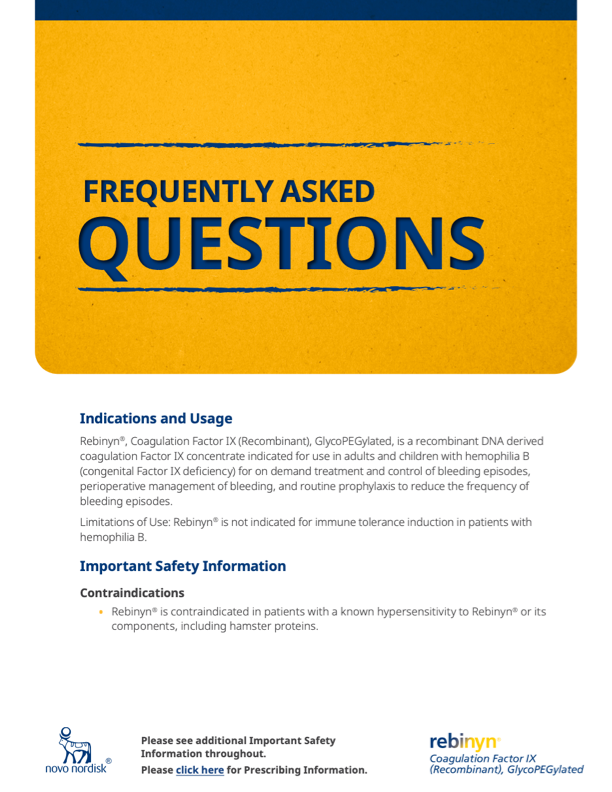
Rebinyn® Frequently Asked Questions
Summary of important information about Rebinyn® and FAQs about the use of Rebinyn® for the treatment of hemophilia B.
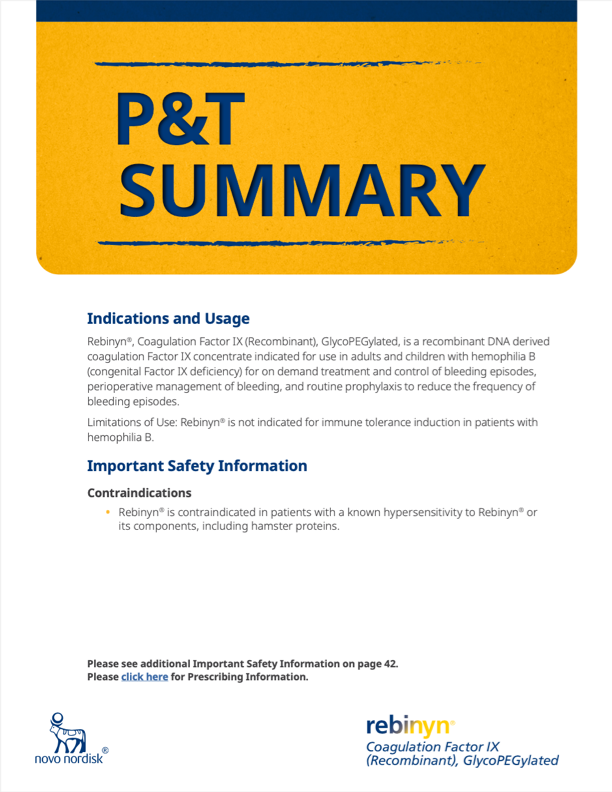
Rebinyn® P&T Summary
Overview of hemophilia B, treatment options, introduction to Rebinyn®, review of Prescribing Information, distribution, and administration information.
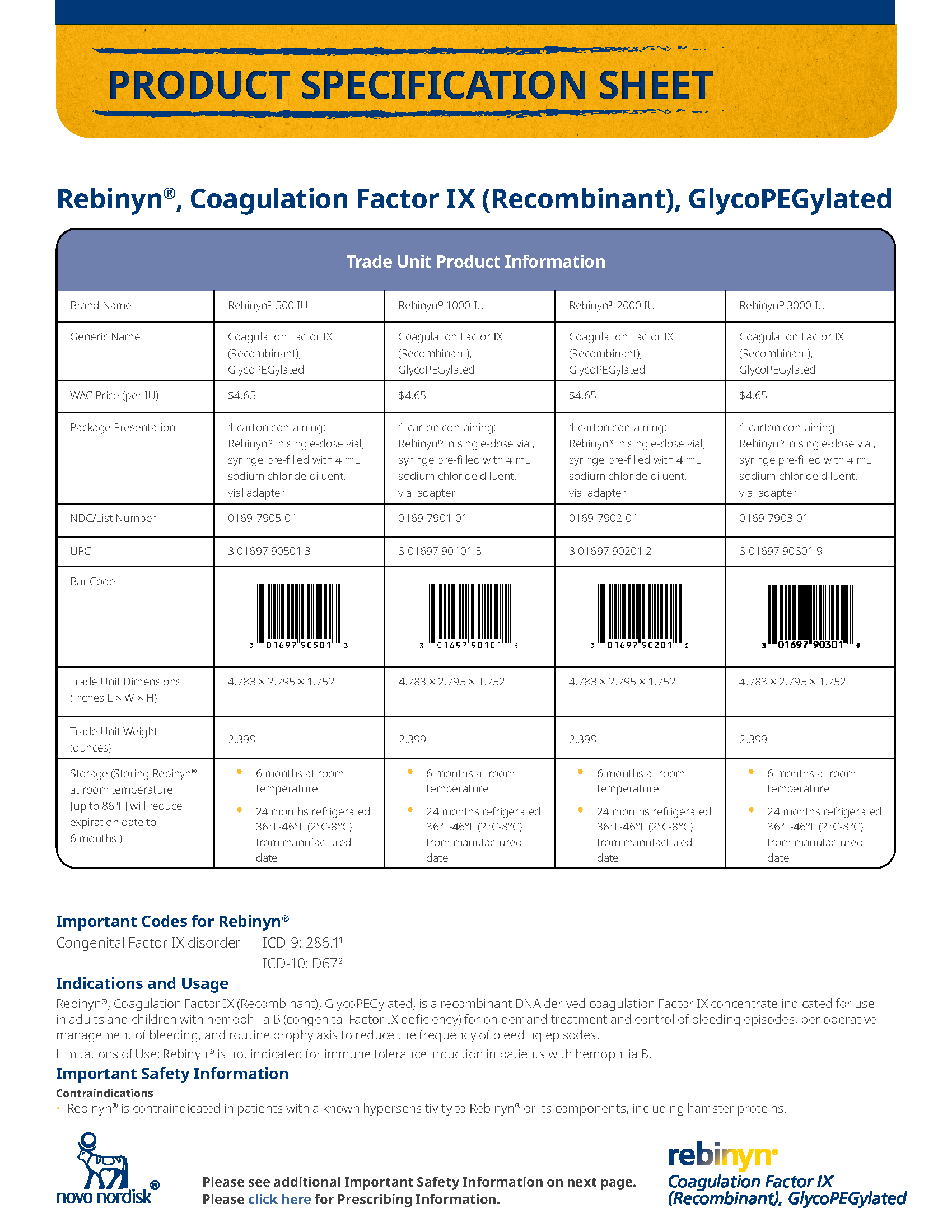
Rebinyn® Product Specification Sheet
Trade unit product specification information, including wholesale acquisition cost and National Drug Code numbers, packaging information, and how Rebinyn® is supplied.
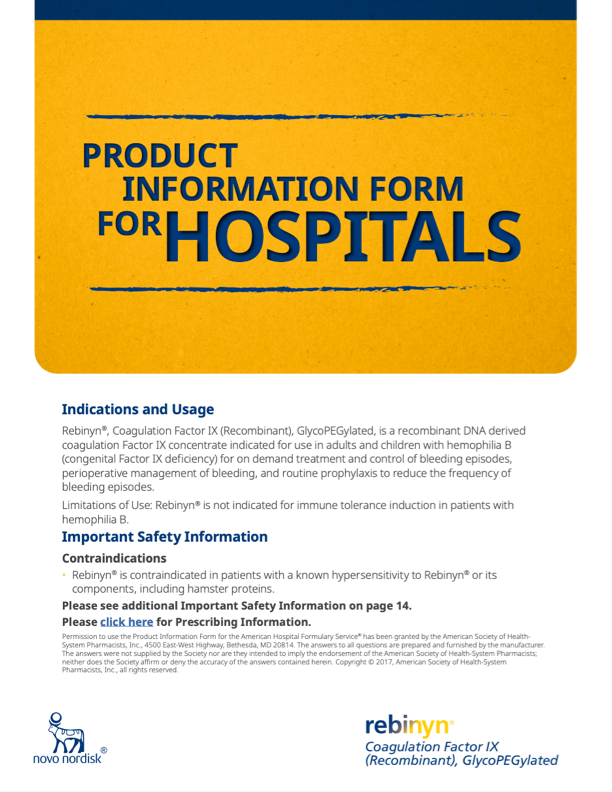
Rebinyn® Product Information Form for Hospitals
Similar to Prescribing Information, American Hospital Formulary Service (AHFS) format. With the AHFS classification number.
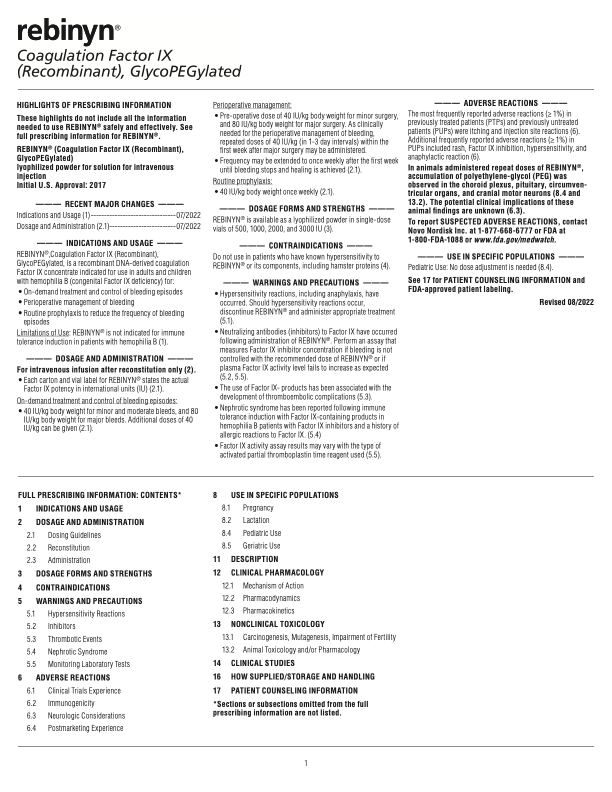
Rebinyn® Full Prescribing Information
Full Prescribing Information for Rebinyn®, patient product information, and instructions on how to use Rebinyn® MixPro®.
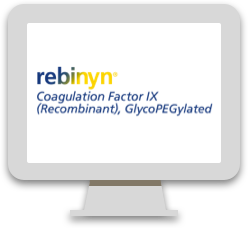
Rebinyn® Professional Website
This website provides information about Rebinyn®, including efficacy, pharmacology, and dosing.
Selected Important Safety Information for Rebinyn®
Contraindications
- Rebinyn® is contraindicated in patients with a known hypersensitivity to Rebinyn® or its components, including hamster proteins.
Warnings and Precautions
- Hypersensitivity Reactions: Allergic-type hypersensitivity reactions, including anaphylaxis, have occurred with Rebinyn®. Signs may include angioedema, chest tightness, difficulty breathing, wheezing, urticaria, and itching. Discontinue Rebinyn® if allergic- or anaphylactic-type reactions occur and initiate appropriate treatment.
Indications and Usage
Rebinyn®, Coagulation Factor IX (Recombinant), GlycoPEGylated, is a recombinant DNA derived coagulation Factor IX concentrate indicated for use in adults and children with hemophilia B (congenital Factor IX deficiency) for on demand treatment and control of bleeding episodes, perioperative management of bleeding, and routine prophylaxis to reduce the frequency of bleeding episodes.
Limitations of Use: Rebinyn® is not indicated for immune tolerance induction in patients with hemophilia B.
Important Safety Information
Contraindications
- Rebinyn® is contraindicated in patients with a known hypersensitivity to Rebinyn® or its components, including hamster proteins.
Warnings and Precautions
- Hypersensitivity Reactions: Allergic-type hypersensitivity reactions, including anaphylaxis, have occurred with Rebinyn®. Signs may include angioedema, chest tightness, difficulty breathing, wheezing, urticaria, and itching. Discontinue Rebinyn® if allergic- or anaphylactic-type reactions occur and initiate appropriate treatment.
- Inhibitors: The formation of inhibitors (neutralizing antibodies) to Factor IX has occurred following Rebinyn®. If expected plasma factor IX activity levels are not attained, or if bleeding is not controlled as expected with the administered dose, perform an assay that measures Factor IX inhibitor concentration. Monitor all patients using clinical observations and laboratory tests for the development of inhibitors. Factor IX activity assay results may vary with the type of activated partial thromboplastin time reagent used.
- Thrombotic Events: The use of Factor IX-containing products has been associated with thromboembolic complications. Monitor for thrombotic and consumptive coagulopathy when administering Rebinyn® to patients with liver disease, post-operatively, to newborn infants, or to patients at risk of thrombosis or disseminated intravascular coagulation (DIC).
- Nephrotic Syndrome: Nephrotic syndrome has been reported following immune tolerance induction therapy with Factor IX products in hemophilia B patients with Factor IX inhibitors, often with a history of allergic reactions to Factor IX. The safety and efficacy of using Rebinyn® for immune tolerance induction have not been established.
Adverse Reactions
- The most common adverse reactions reported in previously treated patients in clinical trials (≥1%) were itching and injection site reactions. The most common adverse reactions (≥1%) in previously untreated patients reported in clinical trials were rash, FIX inhibitors, hypersensitivity, itching, injection site reaction, and anaphylactic reaction.
- Animals administered Rebinyn® showed accumulation of PEG in the choroid plexus, pituitary, circumventricular organs, and cranial motor neurons. The potential clinical implications of these animal findings are unknown. Consider whether the patient is vulnerable to cognitive impairment, such as infants and children who have developing brains, and patients who are cognitively impaired.
Please click here for Prescribing Information.
Selected Important Safety Information for Rebinyn®
Contraindications
- Rebinyn® is contraindicated in patients with a known hypersensitivity to Rebinyn® or its components, including hamster proteins.
Warnings and Precautions
- Hypersensitivity Reactions: Allergic-type hypersensitivity reactions, including anaphylaxis, have occurred with Rebinyn®. Signs may include angioedema, chest tightness, difficulty breathing, wheezing, urticaria, and itching. Discontinue Rebinyn® if allergic- or anaphylactic-type reactions occur and initiate appropriate treatment.
Indications and Usage
Rebinyn®, Coagulation Factor IX (Recombinant), GlycoPEGylated, is a recombinant DNA derived coagulation Factor IX concentrate indicated for use in adults and children with hemophilia B (congenital Factor IX deficiency) for on demand treatment and control of bleeding episodes, perioperative management of bleeding, and routine prophylaxis to reduce the frequency of bleeding episodes.
Limitations of Use: Rebinyn® is not indicated for immune tolerance induction in patients with hemophilia B.
Important Safety Information
Contraindications
- Rebinyn® is contraindicated in patients with a known hypersensitivity to Rebinyn® or its components, including hamster proteins.
Warnings and Precautions
- Hypersensitivity Reactions: Allergic-type hypersensitivity reactions, including anaphylaxis, have occurred with Rebinyn®. Signs may include angioedema, chest tightness, difficulty breathing, wheezing, urticaria, and itching. Discontinue Rebinyn® if allergic- or anaphylactic-type reactions occur and initiate appropriate treatment.
- Inhibitors: The formation of inhibitors (neutralizing antibodies) to Factor IX has occurred following Rebinyn®. If expected plasma factor IX activity levels are not attained, or if bleeding is not controlled as expected with the administered dose, perform an assay that measures Factor IX inhibitor concentration. Monitor all patients using clinical observations and laboratory tests for the development of inhibitors. Factor IX activity assay results may vary with the type of activated partial thromboplastin time reagent used.
- Thrombotic Events: The use of Factor IX-containing products has been associated with thromboembolic complications. Monitor for thrombotic and consumptive coagulopathy when administering Rebinyn® to patients with liver disease, post-operatively, to newborn infants, or to patients at risk of thrombosis or disseminated intravascular coagulation (DIC).
- Nephrotic Syndrome: Nephrotic syndrome has been reported following immune tolerance induction therapy with Factor IX products in hemophilia B patients with Factor IX inhibitors, often with a history of allergic reactions to Factor IX. The safety and efficacy of using Rebinyn® for immune tolerance induction have not been established.
Adverse Reactions
- The most common adverse reactions reported in previously treated patients in clinical trials (≥1%) were itching and injection site reactions. The most common adverse reactions (≥1%) in previously untreated patients reported in clinical trials were rash, FIX inhibitors, hypersensitivity, itching, injection site reaction, and anaphylactic reaction.
- Animals administered Rebinyn® showed accumulation of PEG in the choroid plexus, pituitary, circumventricular organs, and cranial motor neurons. The potential clinical implications of these animal findings are unknown. Consider whether the patient is vulnerable to cognitive impairment, such as infants and children who have developing brains, and patients who are cognitively impaired.
Please click here for Prescribing Information.

